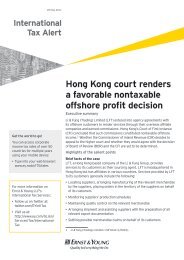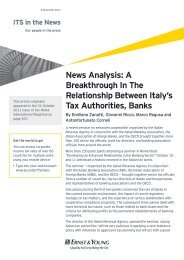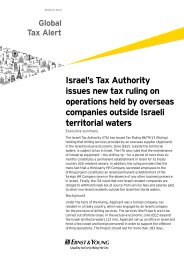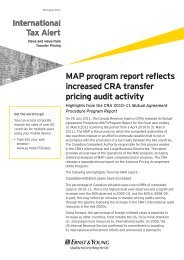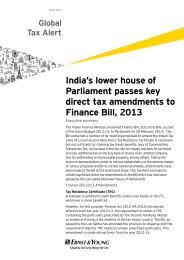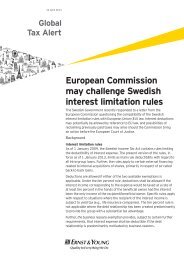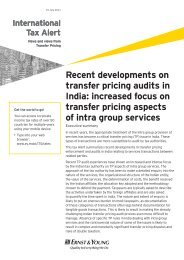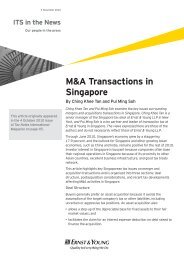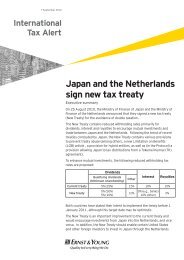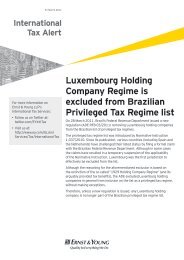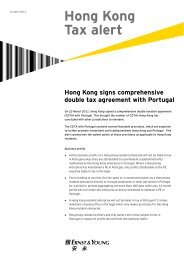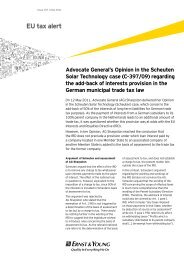Indian Expert Committee publishes draft report on retroactive ...
Indian Expert Committee publishes draft report on retroactive ...
Indian Expert Committee publishes draft report on retroactive ...
Create successful ePaper yourself
Turn your PDF publications into a flip-book with our unique Google optimized e-Paper software.
17 October 2012<br />
Internati<strong>on</strong>al<br />
Tax Alert<br />
<str<strong>on</strong>g>Indian</str<strong>on</strong>g> <str<strong>on</strong>g>Expert</str<strong>on</strong>g> <str<strong>on</strong>g>Committee</str<strong>on</strong>g><br />
<str<strong>on</strong>g>publishes</str<strong>on</strong>g> <str<strong>on</strong>g>draft</str<strong>on</strong>g> <str<strong>on</strong>g>report</str<strong>on</strong>g> <strong>on</strong><br />
<strong>retroactive</strong> amendments<br />
to indirect transfer<br />
Summary<br />
In resp<strong>on</strong>se to c<strong>on</strong>cerns and criticism of the <strong>retroactive</strong> effect of the<br />
Finance Act 2012 (FA 2012), the scope of the <str<strong>on</strong>g>Expert</str<strong>on</strong>g> <str<strong>on</strong>g>Committee</str<strong>on</strong>g> (EC) to<br />
handle General Anti-Avoidance Rules (GAAR) was expanded to include the<br />
implicati<strong>on</strong>s of the applicability of amendments relating to the taxati<strong>on</strong> of<br />
indirect transfers.<br />
The EC acknowledged, after reviewing the provisi<strong>on</strong>s for indirect transfers,<br />
global practices and recommendati<strong>on</strong>s of the Standing <str<strong>on</strong>g>Committee</str<strong>on</strong>g> of<br />
Finance <strong>on</strong> the direct tax code provisi<strong>on</strong>s, and after having c<strong>on</strong>sultati<strong>on</strong>s<br />
with a number of stakeholders, that the existing indirect transfer<br />
provisi<strong>on</strong>s are complex and cannot be implemented without a number<br />
of clarificati<strong>on</strong>s and exclusi<strong>on</strong>s. It recognizes the need for adequate<br />
safeguards to avoid possible unintended c<strong>on</strong>sequences of the wide range<br />
of the <strong>retroactive</strong> amendments. It also emphasizes that the <strong>retroactive</strong><br />
amendments should be carried out <strong>on</strong>ly in the rarest of cases and not for<br />
expanding the tax base.<br />
The EC has suggested that its recommendati<strong>on</strong>s be implemented through<br />
an amendment to the income tax law (ITL), the Income-tax Rules or<br />
through a circular, as may be appropriate.<br />
Background<br />
The FA 2012 enacted taxati<strong>on</strong> of gain arising from an indirect transfer of<br />
an asset or any share or interest in an entity organized outside India, if the<br />
value of such share or interest derives, directly or indirectly, substantially<br />
from assets located in India.
2<br />
The FA 2012 also made <strong>retroactive</strong> amendments to the definiti<strong>on</strong>s of<br />
“capital asset,” “transfer,” etc.<br />
The amendments were to overcome the Supreme Court (SC) judgment in<br />
the Vodaf<strong>on</strong>e case in which the SC held for Vodaf<strong>on</strong>e, stating that gains<br />
arising from a transfer of a foreign holding company shares was not<br />
taxable in India.<br />
Some of the c<strong>on</strong>sequences of the amendments are:<br />
• Ambiguity of the scope of “substantial value” and the risk that a lower<br />
threshold would be applicable to a determinati<strong>on</strong> of when a transacti<strong>on</strong><br />
becomes subject to tax in India.<br />
• Absence of a minimum threshold or extent of shareholding of the<br />
transferor leading to a major c<strong>on</strong>cern for minority shareholders.<br />
• Absence of computati<strong>on</strong> mechanism and provisi<strong>on</strong> to limit taxati<strong>on</strong> to<br />
proporti<strong>on</strong>al <str<strong>on</strong>g>Indian</str<strong>on</strong>g> value.<br />
• Taxati<strong>on</strong> of overseas restructuring involving indirect transfer.<br />
• Multilayer taxati<strong>on</strong> of dividends paid by foreign companies.<br />
• No provisi<strong>on</strong> for a basis step-up for subsequent transfer of shares.<br />
• Taxati<strong>on</strong> in multiple jurisdicti<strong>on</strong>s and possible denial of a foreign tax<br />
credit.<br />
Analysis of EC’s key recommendati<strong>on</strong>s<br />
From a policy perspective, the EC classified <strong>retroactive</strong> amendments in the<br />
following four categories and commented <strong>on</strong> each of them in the following<br />
manner:<br />
Serial number Type of <strong>retroactive</strong><br />
amendment<br />
1 To correct apparent mistakes/<br />
anomalies in the statute<br />
2 To remove technical defects,<br />
particularly in procedure, which had<br />
vitiated the substantive law<br />
3 To “protect” the tax base from<br />
highly abusive tax planning<br />
schemes that have the main<br />
purpose of avoiding tax without<br />
ec<strong>on</strong>omic substance<br />
Internati<strong>on</strong>al Tax Alert<br />
EC comments<br />
Necessary<br />
Necessary<br />
Justified<br />
4 To “expand” the tax base Unfair and against<br />
basic principle of law<br />
as it affects certainty<br />
of law<br />
The EC also commented that<br />
<strong>retroactive</strong> amendments of a tax<br />
law should <strong>on</strong>ly be in the rarest<br />
of cases and cannot be made for<br />
purposes of expanding the tax<br />
base. Further, amendments should<br />
be made <strong>on</strong>ly after exhaustive<br />
and transparent c<strong>on</strong>sultati<strong>on</strong> with<br />
stakeholders who would be affected<br />
by them.<br />
On <strong>retroactive</strong> applicati<strong>on</strong> of tax<br />
<strong>on</strong> indirect transfer of assets<br />
The amendments c<strong>on</strong>cerning<br />
indirect transfers are not<br />
clarificati<strong>on</strong>s as they, in effect,<br />
widen the tax base. Such provisi<strong>on</strong>s<br />
should therefore be applied<br />
prospectively. This would align<br />
with global practice, as well as<br />
the principle of equity, and will<br />
reflect integrity in the formulati<strong>on</strong><br />
and implementati<strong>on</strong> of comm<strong>on</strong>ly<br />
recognized taxati<strong>on</strong> principles.<br />
Recommendati<strong>on</strong>s if <strong>retroactive</strong><br />
taxati<strong>on</strong> of indirect transfers is<br />
applied<br />
• The provisi<strong>on</strong>s should be<br />
applicable <strong>on</strong>ly to that taxpayer<br />
who generated capital gains from<br />
the indirect transfer.<br />
• No pers<strong>on</strong> should be penalized<br />
for failure to withhold tax <strong>on</strong><br />
payments to a n<strong>on</strong>resident pers<strong>on</strong><br />
or a representative as this would<br />
impose obligati<strong>on</strong>s which was<br />
not in the law in existence at the<br />
time when the transacti<strong>on</strong> was<br />
executed.<br />
• In all cases where tax is imposed<br />
under the <strong>retroactive</strong> amendment<br />
provisi<strong>on</strong>, no interest or penalty<br />
should be assessed.
Recommendati<strong>on</strong>s regardless<br />
of prospective or <strong>retroactive</strong><br />
applicati<strong>on</strong> of taxati<strong>on</strong> of indirect<br />
transfers<br />
Recommendati<strong>on</strong>s <strong>on</strong> meaning of<br />
certain terms<br />
• The phrase “share or interest in a<br />
company or entity registered or<br />
incorporated outside India” should<br />
mean and include <strong>on</strong>ly such<br />
share or interest which results<br />
in participati<strong>on</strong> in ownership,<br />
capital, c<strong>on</strong>trol or management.<br />
Mere ec<strong>on</strong>omic interest should be<br />
excluded from the definiti<strong>on</strong>.<br />
• The word “substantially” should<br />
be set at 50% of the value of<br />
assets in India.<br />
• The phrase “directly or indirectly”<br />
may be clarified to represent<br />
a “look through approach”<br />
to narrow its applicati<strong>on</strong> by<br />
disregarding values attached to<br />
the intermediaries between the<br />
foreign company and assets in<br />
India.<br />
• The term “value” should refer to a<br />
fair market value computed under<br />
a discounted cash flow method for<br />
a service sector and a net asset<br />
value method for n<strong>on</strong>-service.<br />
Implicati<strong>on</strong> of amendment to the<br />
definiti<strong>on</strong> of “transfer” introduced<br />
in the FA 2012<br />
• As indirect transfer rules<br />
specifically deal with a share<br />
transfer of a foreign entity having<br />
underlying assets in India, the<br />
expanded definiti<strong>on</strong> of “transfer”<br />
should be limited to the indirect<br />
share transfer.<br />
• Rights of management or c<strong>on</strong>trol<br />
or any other right in an entity<br />
should not be c<strong>on</strong>sidered as<br />
property separate from shares,<br />
unless such property has been<br />
specifically identified as separate<br />
property from shares. This aligns<br />
with the principle that a specific<br />
provisi<strong>on</strong> should override a<br />
general provisi<strong>on</strong>.<br />
Proporti<strong>on</strong>ality of taxati<strong>on</strong><br />
• Only gain specifically attributable<br />
to substantial underlying asset<br />
value should be subject to tax.<br />
Meaning of “an asset” or “a capital<br />
asset”<br />
• The presently enacted provisi<strong>on</strong><br />
in the ITL covers “an asset” or “a<br />
capital asset” as being deemed to<br />
be situated in India.<br />
• As the objective of the indirect<br />
transfer rules is to tax the indirect<br />
transfer of capital assets, the term<br />
“asset” within the scope of the<br />
definiti<strong>on</strong> of deemed <str<strong>on</strong>g>Indian</str<strong>on</strong>g> asset<br />
widens its applicati<strong>on</strong> and leads<br />
to ambiguity in interpretati<strong>on</strong>.<br />
C<strong>on</strong>sequently, a recommendati<strong>on</strong><br />
is to limit the taxati<strong>on</strong> to the<br />
indirect share transfer.<br />
Certain exempti<strong>on</strong>s from indirect<br />
transfer rules<br />
• Minority shareholders: Transfer<br />
of a minority interest in a foreign<br />
company should be excluded as<br />
such transfer would not result in a<br />
transfer of any c<strong>on</strong>trolling interest<br />
in <str<strong>on</strong>g>Indian</str<strong>on</strong>g> assets. Accordingly, a<br />
26% threshold is recommended.<br />
• Listed foreign company:<br />
Exempti<strong>on</strong> may be provided to a<br />
shareholder of a publicly traded<br />
foreign company.<br />
Internati<strong>on</strong>al Tax Alert<br />
• Overseas business<br />
reorganizati<strong>on</strong>: Transfer of shares<br />
or interests in a foreign entity under<br />
intragroup restructuring 1 may be<br />
exempt from taxati<strong>on</strong>, provided<br />
that such transfers are not taxable<br />
in the jurisdicti<strong>on</strong> where the foreign<br />
entity is resident.<br />
• Foreign Instituti<strong>on</strong>al Investor<br />
(FII): An FII is typically a tiered<br />
structure c<strong>on</strong>sisting of investors,<br />
Promissory Notes holders, and<br />
feeder units, with the main FII<br />
registered in India and subject<br />
to tax in India. A n<strong>on</strong>resident<br />
investor making investments in<br />
FIIs should not be subject to tax<br />
where:<br />
− A n<strong>on</strong>resident investor has made<br />
any direct or indirect investment<br />
in an FII; or<br />
− Investment made by an FII in<br />
India represents, directly or<br />
indirectly, the underlying assets<br />
of investment by a n<strong>on</strong>resident.<br />
• Private equity (PE) investors:<br />
PE investors should be outside the<br />
coverage of indirect transfer, where<br />
any of the following c<strong>on</strong>diti<strong>on</strong>s is<br />
satisfied:<br />
− Investment by the n<strong>on</strong>resident<br />
investor in a PE fund or a fundpooling<br />
vehicle which does not<br />
carry ownership rights as interest<br />
similar to ownership rights, such<br />
as share.<br />
1 Intragroup restructuring is defined to<br />
mean: (1) Amalgamati<strong>on</strong> or demerger<br />
as defined under the ITL, subject to<br />
c<strong>on</strong>tinuity of at least ¾ ownership; or<br />
(2) any other form of restructuring<br />
within the group (associated<br />
enterprises), subject to c<strong>on</strong>tinuity of<br />
100% ownership.<br />
3
4<br />
− Investor and its related parties<br />
do not possess more than 26%<br />
interest in voting shares of the<br />
company.<br />
− Investee entity does not have<br />
assets in India that represents<br />
more than 50% of its global<br />
assets.<br />
− Investee is a publicly traded<br />
company.<br />
− Transfer of share or interest<br />
in a foreign entity is due to<br />
reorganizati<strong>on</strong> within a group.<br />
• Taxability of dividend paid by a<br />
foreign company: Dividends paid<br />
by a foreign company should not<br />
be sourced in India to prevent<br />
a cascading effect <strong>on</strong> dividend<br />
taxati<strong>on</strong> in multi-tier overseas<br />
structures.<br />
• Computati<strong>on</strong> provisi<strong>on</strong>s of the<br />
ITL: Existing ITL provisi<strong>on</strong>s do not<br />
have a computati<strong>on</strong> mechanism<br />
for taxing indirect transfers.<br />
Protecti<strong>on</strong> from foreign exchange<br />
fluctuati<strong>on</strong> presently available to<br />
compute gain from direct transfer<br />
should also be provided for<br />
indirect transfer taxati<strong>on</strong>.<br />
• Interplay with tax treaties: India<br />
will not have a right to tax gain,<br />
unless:<br />
− An income tax treaty grants a<br />
right of taxati<strong>on</strong> of capital gains<br />
to India pursuant to India’s ITL.<br />
− The tax treaty specifically<br />
provides the right of taxati<strong>on</strong> to<br />
India <strong>on</strong> the transfer of shares<br />
or interest of a foreign company<br />
or entity.<br />
Comments<br />
The EC recommendati<strong>on</strong>s are truly<br />
beneficial and align with norms of<br />
certainty, predictability and stability<br />
of the tax laws. The investor<br />
For additi<strong>on</strong>al informati<strong>on</strong> with respect to this Alert, please c<strong>on</strong>tact the following:<br />
Ernst & Young Private Limited, Bangalore<br />
• Sudhir Kapadia +91 22 6192 0900 sudhir.kapadia@in.ey.com<br />
• Hitesh Sharma +91 22 6192 0620 hitesh.sharma@in.ey.com<br />
Ernst & Young LLP, <str<strong>on</strong>g>Indian</str<strong>on</strong>g> Tax Desk, New York<br />
• Tejas Mody +1 212 773 4496 tejas.mody@ey.com<br />
• Mithun D’Souza +1 212 773 4683 mithun.dsouza@ey.com<br />
Ernst & Young LLP, <str<strong>on</strong>g>Indian</str<strong>on</strong>g> Tax Desk, San Jose<br />
• Hitesh Sawhney +1 408 947 5501 hitesh.sawhney@ey.com<br />
Ernst & Young LLP, Asia Pacific Business Group, New York<br />
• Chris Finnerty +1 212 773 7479 chris.finnerty@ey.com<br />
• Kaz Parsch +1 212 773 7201 kazuyo.parsch@ey.com<br />
• Jeff H<strong>on</strong>go +1 212 773 6143 jeff.h<strong>on</strong>go@ey.com<br />
Internati<strong>on</strong>al Tax Alert<br />
community may further desire<br />
that the EC restrict indirect<br />
transfer taxati<strong>on</strong> <strong>on</strong>ly to cases<br />
of unproductive real estate<br />
holdings or similar assets in India,<br />
or may restrict such taxati<strong>on</strong> to<br />
abusive investment structures.<br />
In additi<strong>on</strong>, suitable basis stepup<br />
will be necessary. While the<br />
EC has recommended issuance<br />
of administrative instructi<strong>on</strong> by<br />
the Central Board of Direct Taxes<br />
proper statutory safeguards are<br />
more desirable.<br />
The EC has also made equally<br />
str<strong>on</strong>g recommendati<strong>on</strong>s <strong>on</strong> the<br />
GAAR provisi<strong>on</strong>s; accordingly, the<br />
expectati<strong>on</strong>s have turned to the<br />
government of India to adopt and<br />
implement these recommendati<strong>on</strong>s.
Ernst & Young Internati<strong>on</strong>al Tax Services<br />
• Global and EMEIA ITS, Alex Postma<br />
• Americas, Jeffrey Michalak<br />
• Asia Pacific, Alice Chan<br />
• Japan, Kai Hielscher<br />
Ernst & Young Member Firm C<strong>on</strong>tacts<br />
• Argentina Carlos Casanovas Buenos Aires<br />
• Australia Daryn Moore Sydney<br />
• Austria Roland Rief Vienna<br />
• Belgium Herwig Joosten Brussels<br />
• Brazil Gil Mendes Sao Paulo<br />
• Canada George Guedikian Tor<strong>on</strong>to<br />
• Central America Rafael Sayagues San José<br />
• Chile Osiel G<strong>on</strong>zalez Santiago<br />
• China Becky Lai H<strong>on</strong>g K<strong>on</strong>g<br />
• Colombia Ximena Zuluaga Bogota<br />
• Czech Republic Libor Frýzek Prague<br />
• Denmark Niels Josephsen Soborg<br />
• Finland Katri Nygård Helsinki<br />
• France Claire Acard Paris<br />
• Germany Stefan Koehler Frankfurt<br />
• H<strong>on</strong>g K<strong>on</strong>g Christian Pell<strong>on</strong>e H<strong>on</strong>g K<strong>on</strong>g<br />
• Hungary Bot<strong>on</strong>d Rencz Budapest<br />
Balazs Szolgyemy Budapest<br />
• India Hitesh Sharma Mumbai<br />
• Ind<strong>on</strong>esia Peter Ng Jakarta<br />
• Ireland Joe Bollard Dublin<br />
• Israel Shar<strong>on</strong> Shulman Tel Aviv<br />
• Italy Domenico Borzumato Rome<br />
• Japan Kai Hielscher Tokyo<br />
• Korea Kyung-Tae Ko Seoul<br />
• Luxembourg Frank Muntendam Luxembourg<br />
• Malaysia Hock Kho<strong>on</strong> Lee Kuala Lumpur<br />
• Malta Christopher Naudi Msida<br />
• Mexico Koen van ‘t Hek Mexico City<br />
• Middle East Tobias Lintvelt Abu Dhabi<br />
Michelle Kotze Dubai<br />
• M<strong>on</strong>golia Christian Pell<strong>on</strong>e H<strong>on</strong>g K<strong>on</strong>g<br />
• Netherlands Johan van den Bos Amsterdam<br />
• Norway Oyvind Hovland Oslo<br />
• Peru Roberto Cores Lima<br />
• Philippines Ma Fides Balili Makati City<br />
• Poland Andrzej Broda Warsaw<br />
• Portugal Ant<strong>on</strong>io Neves Lisb<strong>on</strong><br />
• Russia Vladimir Zhelt<strong>on</strong>ogov Moscow<br />
• Singapore Andy Baik Singapore<br />
• South Africa Justin Liebenberg Johannesburg<br />
• Spain Federico Linares Madrid<br />
• Sweden Erik Hultman Stockholm<br />
• Switzerland Daniel Gentsch Zurich<br />
• Taiwan Alice Chung Taipei<br />
• Thailand Anth<strong>on</strong>y Loh Bangkok<br />
• Turkey Feridun Gungor Istanbul<br />
• United Kingdom Matthew Mealey L<strong>on</strong>d<strong>on</strong><br />
Anna Anth<strong>on</strong>y L<strong>on</strong>d<strong>on</strong><br />
• United States Jeffrey Michalak Detroit<br />
• Venezuela Jose Velazquez Caracas<br />
• Vietnam Nitin Jain Hanoi<br />
Internati<strong>on</strong>al Tax Alert<br />
Ernst & Young<br />
Assurance | Tax | Transacti<strong>on</strong>s | Advisory<br />
About Ernst & Young<br />
Ernst & Young is a global leader in<br />
assurance, tax, transacti<strong>on</strong> and advisory<br />
services. Worldwide, our 152,000 people<br />
are united by our shared values and an<br />
unwavering commitment to quality. We<br />
make a difference by helping our people,<br />
our clients and our wider communities<br />
achieve their potential.<br />
Ernst & Young refers to the global<br />
organizati<strong>on</strong> of member firms of<br />
Ernst & Young Global Limited, each of<br />
which is a separate legal entity.<br />
Ernst & Young Global Limited, a UK<br />
company limited by guarantee, does<br />
not provide services to clients. For more<br />
informati<strong>on</strong> about our organizati<strong>on</strong>, please<br />
visit www.ey.com. Ernst & Young Private<br />
Limited is a member firm serving clients<br />
in India.<br />
Internati<strong>on</strong>al Tax Services<br />
About Ernst & Young’s Internati<strong>on</strong>al Tax<br />
services practices<br />
Our dedicated internati<strong>on</strong>al tax<br />
professi<strong>on</strong>als assist our clients with their<br />
cross-border tax structuring, planning,<br />
<str<strong>on</strong>g>report</str<strong>on</strong>g>ing and risk management. We<br />
work with you to build proactive and<br />
truly integrated global tax strategies that<br />
address the tax risks of today’s businesses<br />
and achieve sustainable growth. It’s how<br />
Ernst & Young makes a difference.<br />
www.ey.com<br />
© 2012 EYGM Limited.<br />
All Rights Reserved.<br />
EYG no. CM3016<br />
This publicati<strong>on</strong> c<strong>on</strong>tains informati<strong>on</strong> in summary form<br />
and is therefore intended for general guidance <strong>on</strong>ly. It<br />
is not intended to be a substitute for detailed research<br />
or the exercise of professi<strong>on</strong>al judgment. Neither EYGM<br />
Limited nor any other member of the global Ernst &<br />
Young organizati<strong>on</strong> can accept any resp<strong>on</strong>sibility for<br />
loss occasi<strong>on</strong>ed to any pers<strong>on</strong> acting or refraining from<br />
acti<strong>on</strong> as a result of any material in this publicati<strong>on</strong>. On<br />
any specific matter, reference should be made to the<br />
appropriate advisor.<br />
5



